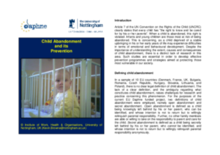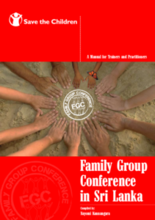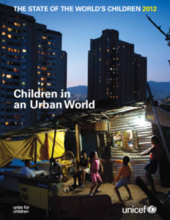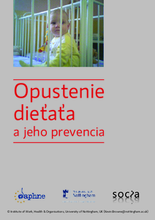Displaying 301 - 310 of 461
This document is an English language summary brochure of the Manual of Best Practice titled ‘Child Abandonment and its Prevention in Europe,’ specific to child abandonment in Romania.
This manual, produced by Save the Children in Sri Lanka, provides guidance on Family Group Conferencing (FGC), which was introduced to the governmental childcare structure in Sri Lanka's Southern Providnce between 2006-2008. Th
This report provides data on children living in urban settings, including statistics, conditions, and personal testimonies. The report also includes UNICEF’s recommendations for policy regarding children in urban settings, working with this population, and for future action. Sections that are relevant to children’s care include: children living and working on the streets, migrant children, urban emergencies, and many more.
This document is a Slovakian language summary brochure of the Manual of Best Practice titled ‘Child Abandonment and its Prevention in Europe,’ specific to child abandonment in Slovakia.
Foster youth in the US do not appear to be receiving many forms of help that are called for in federal law. Over one-third did not receive help they would have liked to have received. System factors play a stronger role than individual indicators of need in help receipt. Independent living services should be more widely available and better targeted.
Understanding youth transitions from out of home care must include developing countries. A model is presented to facilitate this global integration. The model combines resilience and social capital within a social ecology of support. Use of the model is illustrated by a South African youth mentoring scheme for care leavers.
This document analyses the review of 43 impact studies sought to methodically capture the known impacts of economic strengthening programs on the well-being of children (0-18 years) in crisis contexts in low-income countries.
This paper uses comparisons of child benefit packages in the European Union and Central and Eastern European and Confederation of Independent States (CEE/CIS) countries derived using model family methods.
This paper attempts to look at the responsiveness of global social policy to addressing multidimensional child poverty, through the experience of UNICEF's Global Study on Child Poverty and Disparities.
This paper looks at how social protection is evolving in developing countries and how it relates to the vulnerabilities of children. It goes on to present the different conceptual models for protection and how they have changed and been influenced by the changing definition of poverty and the growth in transnational knowledge and policymaking.





